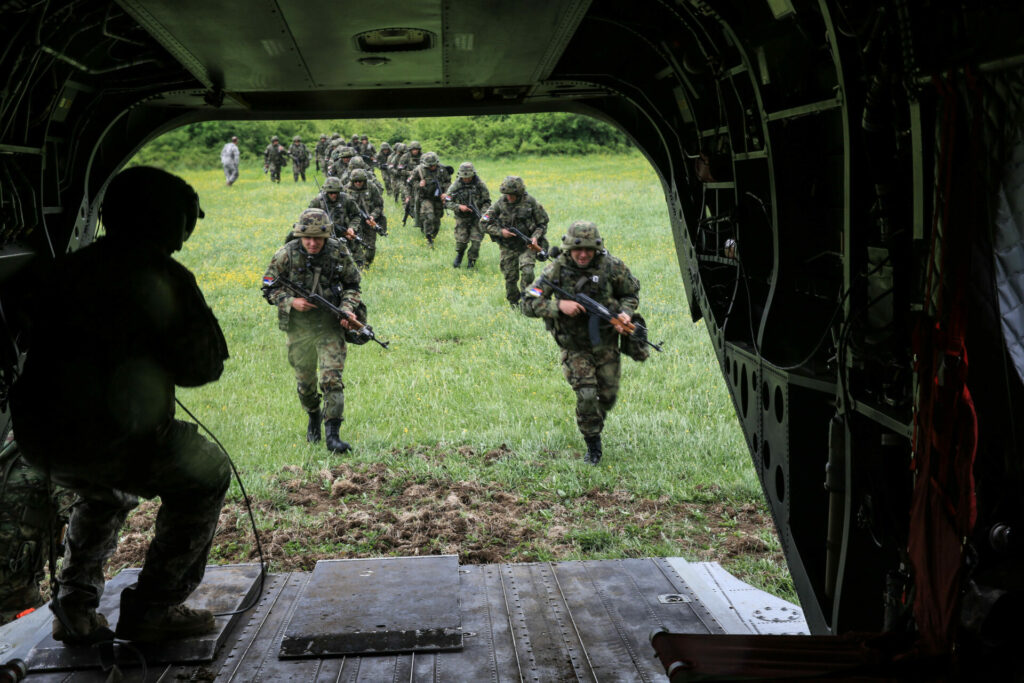Serbia has placed its armed forces at "full combat readiness" as simmering tensions between Serbia and Kosovo threaten to boil over into full-scale armed conflict.
On Monday, Serbian Defence Minister Milos Vucevic stated that Serbian President Aleksandar Vucic had "ordered the Serbian army to be on the highest level of combat readiness, that is, to the level of the use of armed force". He added that Vucic had also issued instructions that the number of troops in Serbia's special armed forces be increased from 1,500 to 5,000.
On the same day, the country's Interior Minister Bratislav Gasic said that Vucic had demanded that Serbia's police and security unit be placed under the command of Milan Mojsilovic, the Chief of General Staff of the Serbian Armed Forces, and that that "all measures [should] be taken to protect the Serbian people in Kosovo".
Mojsilovic has since informed Serbian state TV that the Serbian Army has received "clear and precise" orders from Vucic, and that the "complex" situation on Serbia's border with Kosovo "requires in the coming period the presence of the Serbian army".
"The tasks the Serbian army has got ... are precise, clear, and will be fully implemented," Mojsilovic said.
Old tensions
Relations between Belgrade and Pristina have been deeply strained ever since Kosovo declared independence from Serbia in 2008 following a long and bloody civil war in the late 1990s, which was marked by NATO's bombing of Yugoslavia in 1999, prompted by Serbian-born dictator Slobodan Milosevic's bloodshed and ethnic cleansing of Albanian Kosovars.
Earlier this year, these tensions were significantly exacerbated when the Kosovar Government banned Serbian license plates throughout the country. This enraged Kosovo's small but vocal ethnic Serbian minority, many of whom refuse to recognise the government in Pristina as legitimate and continue to regard Kosovo as a province of Serbia.
The furore over the license plates led to a wave of resignations of ethnic Serb judges and police officers in the Serbian-dominated north of Kosovo.
On 10 December, a paramilitary Serbian groups, which Pristina accuses Serbia of being behind, set up up roadblocks following the arrest of a Serbian ex-policeman who was suspected of being involved in attacks against ethnic Albanian police officers.
Related News
- Bosnia shelves football match against Russia following criticism
- Romanian authorities search Serbian subsidiary of Gazprom
On Sunday, tensions were further inflamed following a shooting incident near a NATO Kosovo Force (KFOR) peacekeeping patrol in the northern town of Zubin Potok. KFOR has since issued a statement claiming that no one was injured that they are "working to establish all the facts".
"It is important for all involved to avoid any rhetoric or actions that can cause tensions and escalate the situation," KFOR said. "We expect all actors to refrain from provocative shows of force and to seek the best solution to ensure the safety and security of all communities."
The EU has similarly called for "maximum restraint" and for the leaders of Serbia and Kosovo to "personally contribute to a political solution".
Kosovo is not recognised as an independent nation by 99 of the UN's 193 Member States. Notably, its independence is not recognised by China and Russia, both of whom are deeply anxious about separatist movements within their own borders.
Serbia has long fostered extremely close ties with Russia. It is the only European country to have maintained regular flights with Russia following the latter's full-scale invasion of Ukraine earlier this year.

